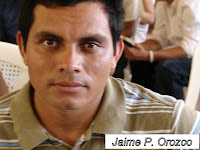Hultner Estrada & Dave Stienstra
Las
Peñitas Beach is a picturesque place. In
this bay of tranquil waters, river currents meet the tides at the Padre Ramos
Estuary, one of the wildlife parks in the department of León.
Very close
to this beautiful place lives Jaime Pastor Orozco, a friendly local fisherman
in his thirties, who is dedicated to the discipleship of youth in his costal
neighborhood.
One day,
while chating about the cultural differences between Anglo-Americans and
Nicaraguans, Jaime Pastor made a comment that I have never forgotten. “North American youth, at 18 years old, are
already looking for a way to leave the nest and live on their own. We Nicaraguans, at age 18, are looking for
ways to bring a woman into our homes.”
 Jaime
Pastor’s commentary has made me think much about the reality of thousands of
young couples that are living with their in-laws.
Jaime
Pastor’s commentary has made me think much about the reality of thousands of
young couples that are living with their in-laws.
Why have
so many of the young people who have married decided to live in the home of
their in-laws?
The
reasons are economic, but also cultural. They lack a stable income, earning less than
$250 per month, and are unable to qualify for a home loan. Much less are they capable of paying the
sizable down payment and associated fees.
But they have not cut the “familial umbilical cord”, which would allow
the young couple to establish their own home.
In our
culture, a “good son” is a thankful son who remains close to his parents. As a result, abandoning the parents’ home is
understood as a gesture of rejection towards those who raised him. In many cases, when a son or daughter leaves,
it means one less income for the family budget, which is the reason that
parents prefer to build an addition onto the house for the newlyweds; it is a
strategy for protecting their mutual finances.
“After
thirty years of marriage, I had never broken this umbilical cord!” shares
Estanislao Ramírez, who, along with his wife, recently completed the marriage
course Restoring the Original Model,
offered by the Nehemiah Center in the city of Estelí.
“I had
never thought about the commandment in the Bible that says, ‘For that reason, a
man will leave his father and mother and be united to his wife,’ and that cord
was still firmly attached for me,” Estanislao adds. His wife interrupts, “From the moment that he
made some changes in the relationship with his family, our communication and
relationship has improved enormously. In this way the course has helped us
greatly.”
Cutting
the familial umbilical cord is a challenge for young couples, but also for
other couples who have years of independence. This is a challenging process if
we consider that our culture gives a greater respect and regard for the mother
or the father than your own spouse.
Fortunately,
many Christians in Estelí and in the coastal area of Leon
and other cities are embracing the biblical principles for a married life
according to God's design.
"Husbands love your wives ... and the wife
must respect her husband."
Ephesians 5:25-33


No comments:
Post a Comment